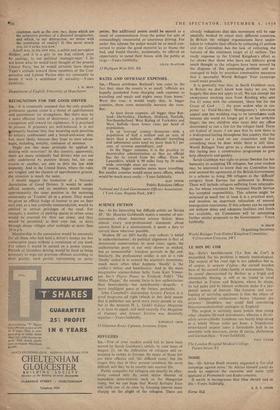REFUGEES
Sig,—Few of your readers could fail to have been moved by Sarah Gainham's article, in your issue of August 21, on the difficulties of refugees still re- maining in camps in Europe. So many of those left are what officials call 'the difficult cases,' but the longer they stay in their present condition the more difficult will they be to resettle into normal life.
Public sympathy for refugees can usually be effec- tively roused only by some major disaster of immediate news-interest, such as the Hungarian rising, but we can hope that World Refugee Year will fulfil one of its aims by focusing interest more sharply on the plight of the refugees. There are already indications that this movement will be suc- cessfully backed by about sixty different countries.
In Britain the refugee organisations have under- taken to redouble their efforts by collecting £1 million and my Committee has the task of collecting the balance of the minimum target of £2 million. The ready response to the United Kingdom's effort so far shows That those who have not hitherto given much thought to the refugees have been moved by the disgrace of this continuing problem and en- couraged to help by practical constructive measures that a successful World Refugee Year campaign could make possible.
It is generally true that, as Sarah Gainham says, in Britain we don't know how lucky we are, but happily this does not apply to all. We can exempt the anonymous working man from Reading who sent five £1 notes with the comment, 'there but for the Grace of God . : .'; the poor widow who in res- ponse to Field-Marshal Montgomery's television appeal sent her wedding ring to be turnedviato cash because she could no longer get it on her arthritic finger; the two children who came into my office determined to run a fete for the refugee fund. These are typical of many. I am sure that by now there is a widespread feeling throughout this country that the refugees are a load on our conscience and that something must be done while there is still time. World Refugee Year gives us a chance to channel this feeling into a constructive programme to give help effectively and quickly.
Sarah Gainham was right to praise Sweden for her humanity in accepting TB refugees, but your readers may be interested to know that my Committee has now secured the agreement of the British Government to a scheme to bring 200 refugees in the 'difficult' category from Europe for settlement in Britain. These will include refugees suffering from tuberculo- sis, for whose treatment the National Health Service has accepted responsibility. This scheme might be criticised as small but at least it is a practical start, and involves an important relaxation of normal immigration restrictions. If this scheme can be carried out without delay and adequate facilities and funds are available, my Committee will be submitting further similar proposals to the Government.—Yours faithfully,
H. SHAW
Organising Secretary World Refugee Year United Kingdom Committee, 9 Grosvenor Crescent, SW I


































 Previous page
Previous page